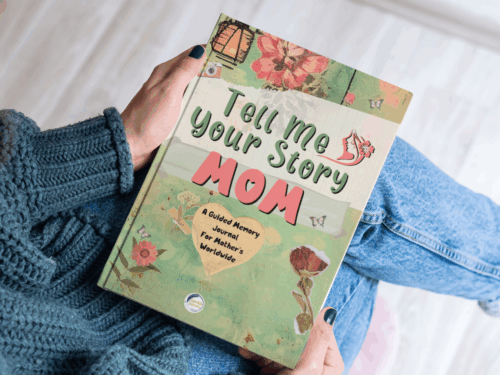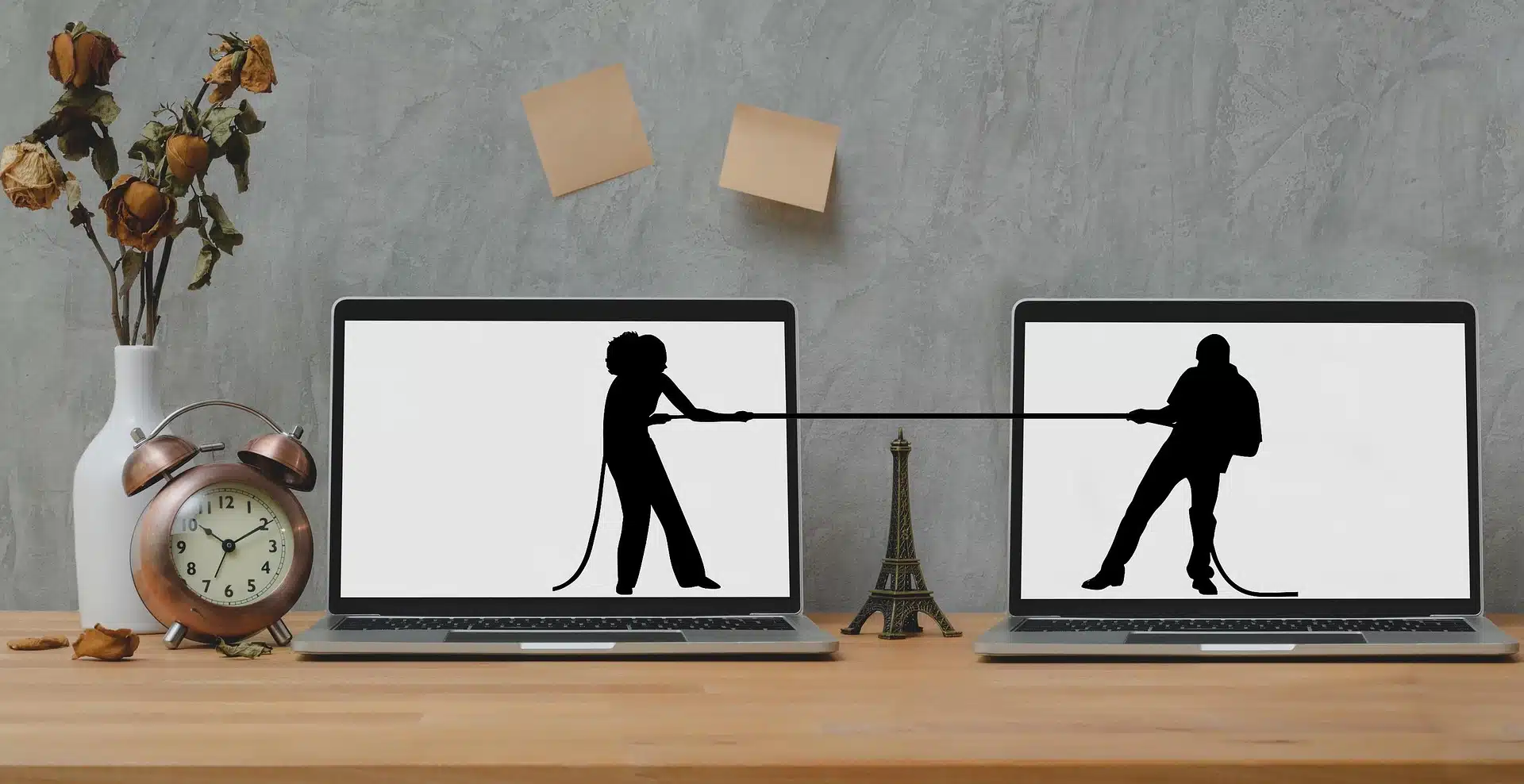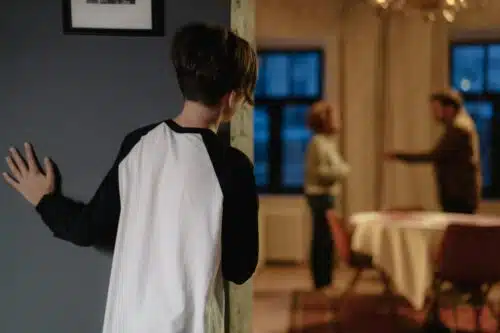 Ever been mid-argument with your partner and thought… hold on, why does this feel like I’m back in my parents’ living room? If you’ve ever wondered whether it’s déjà vu or your partner echoing your parent, you’re not imagining it. Same script, different cast.
Ever been mid-argument with your partner and thought… hold on, why does this feel like I’m back in my parents’ living room? If you’ve ever wondered whether it’s déjà vu or your partner echoing your parent, you’re not imagining it. Same script, different cast.
For me, the moment came during yet another heated conversation about money. Voices rose, my chest tightened, and suddenly I wasn’t just arguing about bank statements—I was back in my childhood kitchen, hearing the same tones, the same fears, the same unspoken panic about “not having enough.”
That’s when it hit me: I wasn’t only fighting with my partner. I was fighting with an old wound.
And that’s when a slightly awkward but deeply honest question came to mind: are we all just out here accidentally marrying our parents?
It sounds dramatic, but psychologists, researchers—and let’s be honest, even our friends—have noticed how often those early family patterns sneak into our adult love lives.
The good news? Once you recognise the pattern, you can change it. And that shift doesn’t just heal your relationship—it has the power to rewrite the story for your whole family.
Why We Recreate Childhood Patterns in Love
So why on earth does this happen? Why do smart, self-aware adults end up replaying the very patterns we swore we had outgrown?
Attachment Theory Made Simple
Here’s one clue: attachment theory. John Bowlby and Mary Ainsworth may have written the official research but let me break it down like this—our early bonds with caregivers set the stage for how we do love later.
If love as a child felt steady and secure, chances are you find it easier to build healthy connections as an adult. But if it was inconsistent, distant, or full of criticism? Well… your nervous system learns that love feels like walking on eggshells. And what do we end up doing? We unconsciously gravitate back to what feels familiar—even if familiar isn’t exactly healthy.
Take money, for example. If finances were always a source of tension growing up, you might now:
- avoid talking about money altogether (because nothing good ever came from it), or
- find yourself drawn to partners who recreate that same tension—because, on some level, it weirdly feels like home.
Sound familiar? You’re not broken—you’re just human. And this is where the cycle starts to show itself.
Family Systems and Generational Echoes
Think family patterns stop at hair colour or who you look like in old photos? Murray Bowen’s family systems theory says otherwise. Families hand down emotional patterns too—like heirlooms you never asked for.
And these patterns aren’t always obvious. Sometimes they show up as unspoken “rules” you absorbed without even realising: we don’t talk about money, or conflict means love is unsafe.
The tricky part? These hidden scripts don’t just pack up and leave when you do. They follow you—sneaking into how you argue, how you handle finances, even how you chase approval in your relationships.
Freud’s Oedipus Complex (A Quick Detour)
Even Freud had something to say about this whole “parental pull” thing. His Oedipus Complex theory basically suggested kids unconsciously fancy the parent of the opposite sex and clash heads with the one of the same sex. A bit dramatic, right?
Now, most modern psychologists have moved well past that literal idea (thank God!). But the bigger takeaway still rings true: our earliest attachments leave deep marks. And sometimes, without meaning to, those old patterns sneak into our adult love lives—showing up in who we’re drawn to, and how we fight once we get there.
The Evolutionary Pull of the Familiar
And it’s not just psychology doing the heavy lifting here—biology’s in on it too. A 2002 study in Evolution and Human Behaviour found that we’re more likely to be attracted to people whose faces resemble our parents. Strange but true: our brains equate familiar with safe, even when “safe” sometimes ends up looking like emotional drama on repeat.
Scientific American also chimed in, reporting that many of us gravitate toward partners who subtly echo our parents in looks—proving this pull isn’t just emotional, it’s physical too.
So, if you’ve ever caught yourself mid-argument about spending habits, spiraling into panic that feels way bigger than the bills in front of you—know this: it’s not just the moment talking. That’s your nervous system replaying an old, very familiar script.
7 Signs Your Partner May Be Echoing Your Parent
This is the heart of it—spotting the cycle. Because once you see the signs, you can’t unsee them. Awareness is the first step toward healing.
Here are some of the clearest clues:
-
Emotional Déjà Vu
Ever feel like you’re suddenly a kid again in the middle of a fight? Maybe your partner says, “You’re being irresponsible with money,” and instantly you’re back in your parents’ kitchen hearing the same scolding? Or perhaps your partner’s raised voice reminds you of your dad’s temper, and your body reacts before your mind even catches up.
These moments of emotional déjà vu are powerful signals that the past is bleeding into the present. You’re not just reacting to your partner—you’re reacting to echoes of your childhood.
-
Recurring Conflict Scripts
Listen closely: do your fights sound like re-runs? Couples often replay arguments that look eerily like their parents’ dynamics. It might be:
- Money → one panics about spending, the other avoids budgeting.
- Parenting → one plays “strict parent,” the other plays “lenient parent.” Good cop, bad cop scenario.
- Chores → one nags, the other resists, just like Mum carrying the household while Dad “forgot.”
Maybe the words aren’t identical, but the rhythm of these fights often feels familiar. One criticises, the other withdraws. One panics, the other dismisses. Psychology Today points out that these repeated dynamics are rarely accidental—they’re usually unconscious re-enactments of the past.
-
Triggers That Feel Bigger Than the Situation
If your reaction feels way bigger than the situation, that’s your clue something deeper is going on. For example, your partner forgets to pay the council tax on time, and suddenly you’re fuming like the world’s about to end. Or they come home from work, flop on the sofa, and switch on Match of the Day—and before you know it, you’re spiraling into panic that you’ve been abandoned.
The truth? It’s not really about the bill or the TV. Those outsized reactions usually mean you’re not just responding to today—you’re responding to every time you felt overlooked, unsupported, or unsafe as a child. The past is slipping into the present, and your nervous system is sounding the alarm louder than it needs to.
-
Projection: Seeing Your Parent in Your Partner
Ever had that weird moment where your partner lets out a sigh, and suddenly it’s not even them you’re hearing—it’s your mum? Or they dismiss something you’ve said with a quick wave of the hand, and bam—you’re ten years old again, standing in your dad’s living room.
That’s projection. It’s when old feelings and memories sneak into the present, painting over what’s really happening. The funny (and slightly unfair) part is your partner might not even be acting like your parent at all—but your nervous system doesn’t care. It’s already decided: yep, this is familiar territory.
And that’s why some rows feel so heavy. It’s not really about the washing up or who forgot the gas bill. What you’re bumping up against are the ghosts of old interactions—stories from the past slipping into today’s arguments.
-
 A Gut-Level Familiarity
A Gut-Level Familiarity
Here’s the thing: sometimes the echoes don’t show up in fights at all—they sneak in right at the start, in who we’re drawn to. You know that feeling of “ah, this person feels like home?” That’s no accident.
The School of Life points out that we often unconsciously marry our parents—not because it’s necessarily good for us, but because it’s familiar. And our brains love familiar. It reads as safe—even when, deep down, our hearts know it might be chaos in disguise.
That so-called comfort can look like:
- Choosing someone who avoids conflict because you grew up in a house where no one raised their voice.
- Falling for a partner who overworks, just like your dad, because busyness feels normal.
- Ending up with someone who manages all the money because that’s what Mum always did.
- Picking a partner who bottles up their emotions because that kind of silence feels “stable.”
- Being drawn to someone unpredictable, because you learned early on to stay on your toes.
Comfort isn’t always comfort. Sometimes it’s just dysfunction dressed up in familiar clothes.
-
Feeling Stuck in Roles
Have you ever noticed how you somehow end up playing the same role in your relationship that you did as a kid? Maybe you’re always the responsible one—paying the bills, juggling the school run, remembering birthdays—because no one else will. Or maybe you’re the peacekeeper, smoothing things over before an argument gets out of hand, because back then keeping the peace was the only way to feel safe.
These roles feel second nature, but they’re not random. They’re echoes—old survival strategies that once kept you steady in your family home, now quietly following you into your adult life.
For some of us, that comfort looks like:
- Taking charge of the money because Dad never could.
- Keeping the house spotless because Mum believed “mess = failure.”
- Saying yes when you want to say no, because you learned rocking the boat wasn’t worth the fallout.
- Being the strong one, because showing your feelings never felt safe.
The real turning point comes when you stop and ask yourself: Did I actually choose this role—or was it handed to me years ago? That’s where the freedom lives. Because once you see the pattern, you get to decide whether to keep it… or finally step out of it.
-
Conflict Styles on Repeat
It’s never just what you fight about, is it? It’s how you fight. Maybe you go quiet, arms folded, giving off the kind of cold shoulder that could chill a room. Or perhaps you find yourself slamming cupboard doors a little louder than necessary, just to make your point. And then there’s the classic—one of you shouting while the other mutters, “I can’t do this right now,” and disappears upstairs.
Here’s the thing: these patterns don’t come out of nowhere. They’re usually borrowed straight from childhood. If you grew up in a house full of shouting, maybe that’s the volume you automatically slip into. Or maybe you swore you’d never be like that—so you avoid conflict altogether and keep it all bottled up.
The problem? When your partner uses the same style—whether that’s withdrawing, raising their voice, or brushing something off—you don’t just react to them. You react to the memory of every time it felt unsafe back then.
Conflict styles are learned. They feel “normal” because you’ve seen them play out a hundred times before. But here’s the hopeful bit: once you notice the script, you don’t have to keep performing it. You and your partner get to write a new one—together.
How This Echo Affects Your Relationships & You
When we don’t interrupt these echoes, the costs don’t just sit quietly in the background—they stack up. And they can get heavy.
Strain on Relationships
Your partner’s meant to be your teammate, right? But when old wounds keep hijacking new arguments, it can feel like you’re stuck on opposite sides of the pitch. Instead of fixing the actual issue—say, who forgot to pay the gas bill—you end up rehashing the same emotional script on loop. It’s draining. And worse, it eats away at the connection you actually want.
Anxiety and Low Self-Worth
If every disagreement feels like life or death, your nervous system never gets a break. You’re constantly on edge, scanning for the next blow-up. And slowly, those childhood whispers creep back in: you’re too much… you’re not enough… you’ll never get it right…you’re not smart enough. Sound familiar? That’s not truth talking—it’s the echo of old wounds.
Passing It On
Here’s the gut punch: our kids are watching. Research on Adverse Childhood Experiences (ACEs) shows these patterns don’t just vanish—they’re often passed down like unwanted family heirlooms. If you grew up with money anxiety and now find yourself arguing about the same thing, chances are your children are quietly learning that love equals stress.
But here’s the lifeline: cycles aren’t curses. They can be broken. And spotting them? That’s your first power move. Once you see the pattern, you’ve already started to change it.
How to Break the Cycle: A Roadmap to New Patterns
Breaking free from these old cycles isn’t about becoming some perfect version of yourself who never argues again. (Spoiler: that couple doesn’t exist!) It’s about awareness and those small, intentional shifts that change the game one moment at a time.
 Step 1 – Awareness Through Reflection
Step 1 – Awareness Through Reflection
Think of this as switching on a torch in a dark room. You can’t change what you can’t see. So start by noticing when you feel triggered.
- Do money chats leave you panicked, like you’re a kid at the kitchen table again?
- Does your partner’s silence twist your stomach because it echoes a parent who shut down?
The trick is not to judge yourself but to get curious. This is where journaling comes in—it slows you down long enough to notice what’s really underneath.
👉 My Tell Me Your Story Mom journal was designed for exactly this. The prompts guide you through your mother’s story—her fears, her habits, the lessons she carried. And often, when you see her patterns, you finally understand yours.
Step 2 – Inner Child Healing
Here’s the thing: when those old wounds get poked, it’s not just “today you” reacting—it’s the younger version of you who still wants to feel safe. That’s where re-parenting comes in.
Next time you feel yourself spiraling, pause and talk to little-you. Out loud if you need to:
- “I know you’re scared, but I’ve got this now.”
- “You’re safe. We’re not back in that old row—this is today.”
Sounds a bit woo, I know—but it works. Soothe your inner child, and you interrupt the panic loop. You show your body it doesn’t have to keep replaying the past.
Step 3 – Conscious Communication
This is where the magic shows up in your relationship. Instead of launching into “You always waste money!” try swapping blame for vulnerability:
- “I feel anxious when we overspend—it reminds me of growing up with money stress.”
That tiny shift takes the sting out of the argument. It invites your partner in, instead of pushing them away. And the bonus—it actually helps you get your needs met.
Step 4 – Seek Support
Let’s be real: patterns that took decades to form won’t dissolve after a few journaling sessions and a couple of deep talks. Sometimes, you need backup. That could look like therapy, coaching, somatic work, or even a trusted group of friends who get it.
The point is—you don’t have to do this on your own.
Breaking the cycle isn’t about becoming flawless or fight-free. It’s about noticing when the past is hijacking the present—and then choosing differently in that one moment. That’s how you start writing a new script. One row. One conversation. One conscious pause at a time.
 Journaling as a Gentle Healing Tool
Journaling as a Gentle Healing Tool
Here’s the thing: writing isn’t just “dear diary” stuff. Research shows expressive writing can lower stress and sharpen emotional clarity (Pennebaker, APA). In plain English? Putting pen to paper turns those swirling, vague feelings into something you can actually see—and shift.
That’s why I created the Tell Me Your Story Mom journal. Because honestly? Staring at a blank page when you’re already overwhelmed is just another way to freeze. These prompts give you a starting point, guiding you to:
- See your mum’s story in a new light.
- Spot the patterns she passed down (especially around money, safety, or love).
- And—this is the juicy bit—choose which ones you want to keep and which ones you’re ready to release.
The best part? Compassion grows. Resentment softens. And you realise—you’re not stuck. You get to write a new story.
6 Quick Prompts to Break the Cycle (Try One Today!)
Because awareness is great, but action is better—here are six mini-practices you can start right now:
- Name the Echo
Next time you’re triggered, pause and ask: “Who does this remind me of?” That one question shines a light on whether you’re reacting to your partner—or your past. - The Inner Child Check-In
Hand on heart. “What does younger me need right now—safety, reassurance, calm?” Give yourself those words before you speak. Instant nervous system reset. - Swap Blame for Vulnerability
Ditch “You never care about the budget!” and try “I feel anxious when money feels tight—it takes me back to childhood chaos.” Watch the energy in the room change. - Journal Prompt: The Money Memory
Write down your earliest money memory. What was said? What wasn’t? How did you feel? Then connect the dots: where does that memory still run the show today? - Journal Prompt: The Role I Inherited
Were you the responsible one? The peacekeeper? The invisible child? Write it down. Then ask: am I still carrying that role into my relationship? - Journal Prompt: Write a New Story
Draft a new script for how you want to respond. Example: “Instead of shutting down, I’ll ask for a 10-minute break and come back ready to talk.” Small, powerful shift.
 Moving Forward With Hope
Moving Forward With Hope
Here’s what I really want you to hear: noticing these echoes doesn’t mean you’re broken. It means you’re awake. And being awake? That’s where change begins.
We all carry pieces of our parents. Some are beautiful—humour, resilience, creativity. Others… not so much. Like money anxiety that sneaks into every conversation about bills. Or explosive conflict that turns a small row into a full-blown storm. But here’s the hopeful bit: the moment you see the pattern, you’ve already taken the bravest step.
Breaking the cycle isn’t about being the perfect partner (they don’t exist!). It’s about pausing when the old script shows up, reflecting on what’s really happening, and daring to respond differently. It’s about remembering your parents’ story shaped you, but it doesn’t have to define you.
If you’re ready to start gently exploring those family patterns, my Tell Me Your Story Mom journal can walk beside you. Think of it as a compassionate guide—helping you connect the dots, soften resentment, and choose a new path forward. Because sometimes, the key to moving ahead is finally understanding where we came from.
So let me leave you with this: have you ever caught yourself mid-argument thinking, wow… this feels just like home? And if so—what helped you begin to break that cycle?
Then share this post to inspire someone else to do the same.
I would love to hear your comments and thoughts!
Peace & blessings
Teresa
FAQs
Why do we tend to recreate childhood patterns in our adult relationships?
We recreate childhood patterns in our adult relationships because our early attachment with caregivers shapes how we view love, safety, and conflict. If love felt insecure or inconsistent as a child, our nervous system learns that love is unpredictable, leading us to unconsciously seek familiar, often unhealthy, relationship dynamics.
How can I recognize if I’m echoing my parents in my relationship?
You can recognize if you’re echoing your parents by observing patterns like reactions that feel emotionally familiar, recurring conflict themes, disproportionate responses to situations, or feeling drawn to partners who resemble your parents’ behaviors or appearance. Awareness of these signs helps you see the influence of family dynamics.
What are some signs that my partner might be echoing my parent?
Signs include feeling intense emotional déjà vu during conflicts, recurring arguments that mirror family dynamics, triggers that make reactions feel larger than the situation, projection of your parent’s traits onto your partner, and feeling drawn to someone because they remind you of your family members.
How does this pattern affect my relationship and mental health?
Repeating family patterns can strain your relationship by causing misunderstandings and unresolved conflicts, increase anxiety and low self-esteem, and potentially pass dysfunctional behaviors down to children. Recognizing these patterns is vital for healing and creating healthier connections.
What are some practical steps to break the cycle and create healthier relationship patterns?
Practicing awareness through reflection, healing your inner child, communicating vulnerably, seeking support like therapy, and journaling about family patterns are effective steps. These actions help you understand, interrupt, and change the old scripts to foster healthier relationships.





